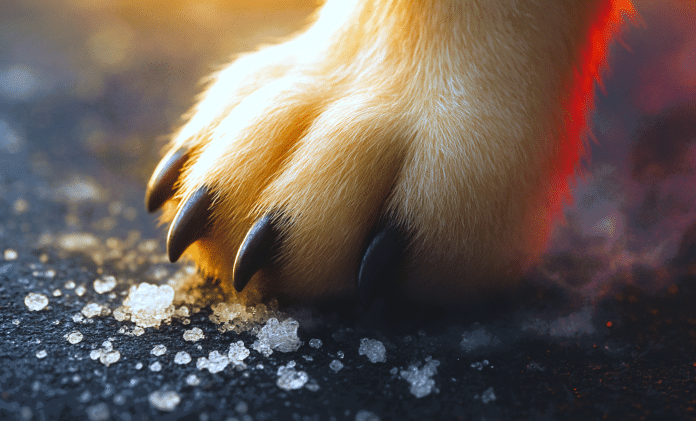Milwaukee, WI – As the first winter snow blankets Wisconsin and temperatures drop into the teens and 20s, veterinarians are warning pet owners to take precautions against a seasonal hazard that goes far beyond the cold: road salt and chemical de-icers. These products, used extensively across the state, can burn paw pads, irritate skin, and cause toxic reactions if pets lick or ingest them.
Most de-icing mixtures used in Wisconsin contain sodium chloride, calcium chloride, or magnesium chloride—chemicals that melt snow and ice but are harsh on sensitive paws. Even brief exposure can cause cracking, redness, or chemical burns. When dogs lick their paws after walks, they risk ingesting salt residues that can lead to vomiting, diarrhea, excessive thirst, or lethargy. Severe salt ingestion can cause seizures or kidney failure if untreated.
Veterinary experts say pets across Wisconsin are especially at risk due to the state’s heavy reliance on road salt for winter safety. In addition to public road treatments, many commercial and residential ice melts contain industrial additives or heavy metals that increase toxicity over time. Repeated contact can cause chronic irritation or internal health issues in pets.
To protect animals, veterinarians recommend rinsing paws with warm water after each walk and drying them completely. Applying a protective paw balm or wax before heading outdoors can prevent irritation, and trimming fur between the toes helps reduce salt and slush buildup. Booties can also offer solid protection for dogs that tolerate them. Homeowners are encouraged to switch to chloride-free, pet-safe ice melts to reduce the risk of exposure.
With snow accumulation and freezing drizzle expected through early next week, veterinarians urge owners to limit outdoor time during the coldest hours and check for signs of limping or licking—both early indicators of salt irritation.
As winter takes hold across Wisconsin, experts emphasize that the biggest threat to pets this time of year isn’t the cold air above—but the chemicals coating the ground below.




